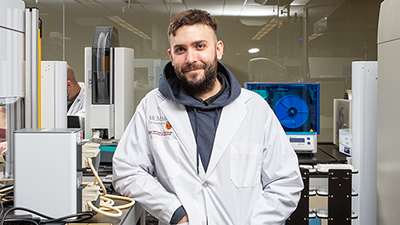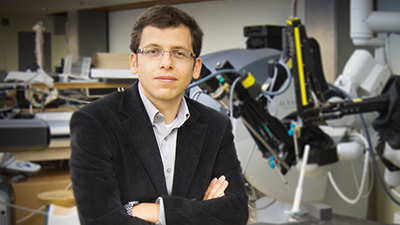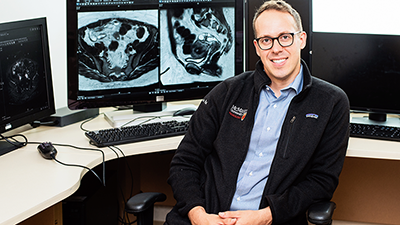 Dr. Jonathan Stokes
Dr. Jonathan Stokes
Jon Stokes received his BHSc in 2011 and his PhD in antimicrobial chemical biology in 2016, both from McMaster University. From 2017 to 2021 he was a postdoctoral fellow at the Broad Institute of MIT and Harvard, carrying a prestigious Banting Fellowship from 2018-2020. Upon completing his postdoc, Stokes established his laboratory back at McMaster in the Department of Biochemistry and Biomedical Sciences in August 2021. The Stokes lab leverages a balance of experimental and computational approaches to discover the next generation of life-saving antibiotics with novel structures and functions that expand the capabilities of these medicines beyond the current state of the art. One of the lab’s primary interests, quite broadly, is in the application of deep learning approaches to help us predict the antibacterial properties of structurally novel small molecules. Along with his scientific endeavors, Stokes has a strong interest in increasing the rate at which fundamentally novel antibiotics are developed, approved, and administered to patients in need. To this end, as a postdoc he co-founded a non-profit organization, Phare Bio, which aims to de-risk promising antibiotic candidates and position these molecules for more rapid advancement through the clinical trial process.
 Dr. Mehdi Moradi
Dr. Mehdi Moradi
Mehdi Moradi is a data scientist with extensive academic and industry experience in AI, healthcare AI and data science groups in academia and industry. Moradi completed his PhD at the School of Computing at Queen’s University in 2008. After completing research fellowships at the University of British Columbia (2008-2011) and at Harvard Medical School (2011-2012), Moradi joined the Department of Electrical and Computer Engineering at the University of British Columbia as an assistant professor in 2012 and IBM Research in 2014. He served as an associate editor of IEEE Signal Processing Letters and Journal of Medical Physics, an area chair Medical Image Computing and Computer-Assisted Interventions (MICCAI 2013, 2014, 2015 and 2016, 2020 and 2022), and have served as a co-chair of MICCAI 2014 Workshops and Tutorials. Moradi is also a program committee member at SPIE Medical Imaging, Digital Pathology Meeting, since 2015. He received two Outstanding Technical Achievements awards at IBM Research in 2016 and 2020 for his innovations. Moradi is currently a senior data scientist at Google, and an associate professor in the Faculty of Engineering at McMaster University, since 2022.
 Dr. Christian van der Pol
Dr. Christian van der Pol
Christian van der Pol completed an undergraduate degree in Electrical and Biomedical Engineering at McMaster in 2007, a Killam Fellowship at Harvard in 2007, medical school at the University of Toronto in 2011, Diagnostic Radiology residency at The Ottawa Hospital in 2016, and a Clinical Fellowship in Abdominal Imaging and Intervention at Brigham and Women’s Hospital, Harvard Medical School, in 2017. He has since been an Abdominal Radiologist at Hamilton Health Sciences and is an Associate Professor of Radiology at McMaster University. His research expertise includes hepatobiliary and pancreatic imaging, as well as evidence synthesis, with 65 peer-reviewed publications and $1.5 million in grant funding. Dr. van der Pol is a consulting editor for the American Journal of Roentgenology (AJR) and the Canadian representative on the World Health Organization (WHO) Classification of Tumours Radiology Advisory Board. Recently, medical artificial intelligence has become an area of interest. He is excited to collaborate with this talented and diverse group with a common interest in medical AI, and is optimistic that new insights and directions will emerge from these rounds.

